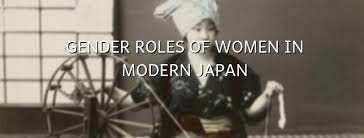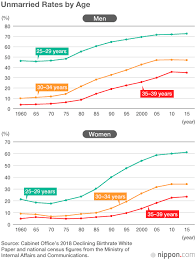Many things have changed in Japan since WWII but many things have also stayed the same. This dichotomy is creating unwanted trends and having far reaching consequences for the entire country.
Certain cultural expectations have remained static over time. Employees are still expected to devote most of their waking hours to their company. Working past 10 PM is the norm and men are often expected to take clients out for drinks after work. Rigorous targets must be met in order to get raises and promotions. This culture of overwork even has a name – “death from overwork.” It’s been argued that this demanding work environment leads to inefficiency and low productivity yet it still has a tight hold on Japanese work culture.

Another social phenomenon that has not changed is that women are still expected to care for the home, children and elderly relatives. They are also still given onerous tasks that they must fulfill to adequately perform their roles in the home. Cooking, for example, is a major job for Japanese women. They must prepare numerous, small dishes for their families every day AND the school lunches that they must prepare for their children have to be works of art!
Dishwashers are not as common as in the U.S and neither are dryers capable of doing large loads. So most women have to hang wet clothes on clotheslines outside, which dramatically increases the amount of time needed to do a family’s laundry.
But this is just the beginning. American women would be horrified at the volume of paperwork women have to do, every day, for their children’s schools and day-cares.
That’s right. Pre-schools demand meticulous and voluminous daily journals documenting their children’s temperatures, what they eat, their moods, conversations, sleeping hours and playtime activities. The elementary schools and after school tutoring classes, ubiquitous for older children, also require that a parent corrects and approves every page of their child’s homework. Women are thus swamped with household and bureaucratic tasks at home, which affects their ability to work outside the home.

Japanese elementary school class
Here comes the change part – now close to 70% of women 15-64 have jobs. Nevertheless, the heavy burden of domestic tasks holds women back from advancing in their careers. They can’t put in the crushing hours men do when they are on the promotion track. As a result, almost half of all working women only work part-time and often the other half are on temporary contracts. This creates a huge pay gap between men and women and also a shortage of women in management-level jobs.
Only 1% of the female workforce is in management. Yet women who work more than 49 hours a week typically also put in close to 25 hours of housework a week. Men typically average less than 5 hours a week, even when their wives work too. Thus Japanese men do less housework and childcare than men in any other of the world’s wealthiest nations.
This rigidity of gender roles at home has ramifications in the economy and society. Japan’s economic status in the world has stagnated and China has overtaken Japan as the world’s second-largest economy. The Prime Minister of Japan has pledged to return the economy to steady growth, which means countering the severe labor shortage due to a declining as well as a rapidly-aging population. To increase the workforce and energize the economy, the Prime Minister’s goal is to elevate and increase women’s participation in the workforce. This initiative is called “womenomics.”

The problem is that for women to increase their impact on the workplace, everyone has to reduce the bruising hours expected at work so the women can begin to catch up to the men. In addition, the rigid and excessive demands on a woman’s time at home have to be reduced – and/or these tasks must be shared more equally by the husbands. But that would require a major change in social norms and entrenched gender roles, which is not likely to happen quickly.
However, social change is happening in Japan, just not in the way the government wants or society needs. The biggest trend in Japanese society today is the tremendous surge of women choosing not to marry at all! More and more women are rejecting the life of domestic drudgery that comes with marriage and parenthood and the concomitant drag on their career advancement.

The Japanese are exhausted most of the time
This is a problem because Japan is also suffering from a decline in population that politicians are frantically trying to reverse. The birth rate is the lowest it’s been since 1899 when record-keeping began. The economy can’t continue to grow if the workforce continues to shrink.

The statistics on women staying single are dramatic. In the mid-1990s, only 1 in 20 women in Japan had never been married by the age of 50. By 2015, 1 in 7 remained unmarried. In women ages 35-39, 10% were unmarried 20 years ago and now 25% are staying single. The number of couples getting married is at its lowest level since WWII.

There is some good news for the business world. A growing number of new businesses have sprung up to cater to this large market of single women. Single Karaoke Bars have women-only zones, restaurants market to solo diners, travel companies book tours for single women and photo studios offer photoshoots where women put on wedding dresses and pose for solo bridal pictures. There are even solo wedding ceremonies for women committing to their independence and their single, career-oriented lives.

Women no longer need husbands to ensure their economic security because if they stay single and avoid the cultural demands on wives and mothers, they can put in the hours to get ahead at work. They can also have the freedom to pursue hobbies, travel and cultivate large circles of friends. Many see this lifestyle as more rewarding than being stuck in the quicksand of the socially mandated gender role of wife and mother.
Until these domestic roles are redefined, Japan will see more and more women opting out of the domestic rat race. And the population will continue to decline along with the economy. I’m not sure how the government can mandate the kind of social change they need, but they may have to try. It should be interesting to watch how this social experiment works out.
Categories: #Women, #Work, Relationships







Fascinating! I wondered if there were changes in how the family operated. It seems there are some improvements for women, but much more is definitely required!
LikeLike
It’s such a culture-wide set of issues, I can’t imagine that it will be easily settled. In ONE respect, China beat Japan completely because many of these issues were settled when they become Communist. It may be the single good thing to come out of Chinese communism — that and making it possible for most people to actually EAT. There used to be mass starvation.
LikeLike
The only ‘improvement’ for women in Japan is that they are welcomed, albeit in a limited way, into the work force now. But that ‘advancement’ for women has come with a high price – the double burden of crushing home duties as well as long hours at work.
LikeLike
Yes, I got that from what you wrote. 2nd class citizens, chattel if you will.
LikeLike
those school lunches were over-the-top!
LikeLike
I’m amazed that all women in Japan seem to be artistic and creative! I couldn’t do those fancy lunches! Maybe the skills are passed down from mothers to daughters. Or there are books or videos to teach you the tricks of the trade! I certainly hope the kids appreciate their mothers’ artistry and don’t just wolf down their lunches without admiring them first!
LikeLiked by 1 person
the lunches seem very Instagram-friendly!
LikeLike
I always thought a decent quality sandwich, a couple of cookies and some fruit were more than enough for me.
LikeLike
You can see why there’s a decline in the Japanese population.
Leslie
LikeLike
I’m amazed that anyone gets married and has kids in Japan! At least women. Men, as everywhere else, have it much easier, though the expectations for them at work are off the charts. The government is tearing it’s hair over the population decline but there are no quick fixes for a culture so seeped in tradition and historical role definitions. It will be interesting to see what happens over the next few years. A real time social experiment.
LikeLiked by 1 person
They’ll have to pay women to stay at home and raise a family. Also they’ll have to raise their status in society otherwise they are doomed.
Leslie
LikeLike
The Japanese may also have to make it easier and socially acceptable for men to help at home – and give them the time away from work to be a more active part of family life. It all can’t fall on the woman in a society that needs women to work as well as raise children.
LikeLiked by 1 person
Yes there’s just too much resting on the shoulders of women, Ellin.
LikeLike
There’s just too much resting on the shoulders of women Ellin…
LikeLike
I’m reading Melinda Gates, The Moment of Lift, in which she discusses the benefits to the entire community of empowering women. She’s done a lot of work in Kenya and other African countries and in India. Key points so far — preventing and/or spreading out pregnancies with contraceptives helps entire communities; education of women empowers women, who then empower entire communities. It’s a great read.
LikeLiked by 1 person
I think she’s right slmret. Unless women have control over their fertility they wouldn’t have the energy to raise the children that did plan to have.
Leslie
LikeLike
I wonder how the contraceptives issue is going for them? Why do I have the feeling that while there may be a technical “it’s okay” thing, that it is deeply frowned on?
LikeLike
I remember watching a documentary about dating in Japan and it was obvious that the workplace culture is a major factor. It will probably take a couple more generations to even things up a bit so that both men and women can have time for work and family life. Not an easy thing to change in a rather conservative country. I had not heard about the solo weddings though, that is interesting although I think probably pushed along by commercialism. All those single career women don’t benefit the wedding industry much.
LikeLike
I think there are solo weddings here and in the U.K. as well, just not as many as in Japan. Life in Japan sounds pretty stressful and exhausting. There is no balance between work and family life and it’s no surprise that women are opting out of having to participate in two rat races at the same time. One is bad enough. I’m surprised anyone has time to date and get married at all.
LikeLiked by 1 person
The documentary did highlight just how difficult that was.
LikeLike
Such an interesting and informational post! Solo weddings…maybe that will catch on here?
LikeLiked by 1 person
I thought that was brilliant too!
LikeLiked by 1 person
There are solo weddings here! I read about them a while ago. Now I’m interested and will google them and see how they play out in the U.S.
LikeLiked by 2 people
Really? How intriguing!
LikeLike
Doesn’t sound good for Women in Japan. For shame.
LikeLike